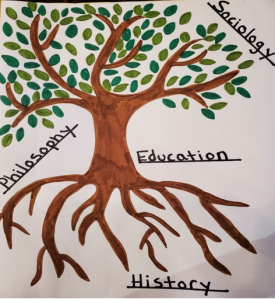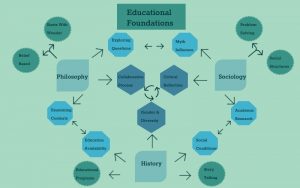“Why the Foundations of Education Matter” Analysis and Presentation
Summarizer/Visualizer
This article shows the importance of the history, sociology, and philosophy of education, and how it provides insight into the profession.
History
-We should not just study history, we should participate in it.
-The main goal is to bring people together, to help humanity understand itself, and to “achieve a better tomorrow by working together”.
-By looking at the history of education, it helps us understand how social conditions affect our students.
— Understanding how history has constructed differences, and the increase in multicultural classrooms. Thinking like historians helps us remove our blinders.
Philosophy:
-Not everyone can see the world through the same lenses, everyone interprets the world differently.
– Philosophy of education promotes a higher understanding of our world.
– To teach students to act on their own knowledge and not societal expectations.
-Process of mutual seeking and wonder, and collaborative questioning.
-Virtues of teaching- humility, courage, open-mindedness, and empathy.
– “Teacher candidates who learn to probe their own convictions, opinions, and habits are more likely to teach with greater understanding, confidence, and humility than those who do not.”
Sociology:
-Helps us understand how students abide by the norms and values of society, and how social pressures can alter their thinking.
-Helps us understand the role that school plays in society.
-Our goal is to meet all students’ needs
– By studying the sociology of education, it helps us recognize when a student is struggling, and how to connect with them
– Helps us understand that schools may privilege some students, while disadvantaging others.
-Taking a scientific approach and analyzing data allows teachers to understand or question how social factors are related to academic achievement.
Symbol:

Webber/Questioner

Unanswered Questions
- Why do the foundations of education matter for students as learners?
In the chapter, “Why the Foundations of Education Matter”, it focuses on how teachers and teacher candidates can use these foundations in their profession. Another crucial piece of education is the students and what these foundations mean for their critical thinking skills. In the same way that these foundations contribute to the way teachers teach, they also contribute to how students learn, Across each of the disciplines, there many topics and discussions that cane had with students from any age in regards to diversity, society, moral values and critical reflection. Incorporating these ideas into the regular school lessons can have a profound effect on students. Through history, students can gain insight into how the education system they reside in currently came to be and how it has evolved. It also can be important to learn how their current education system is not the same universally and that children around the world have different educational spaces. In regards to philosophy, students can have healthy discussions and debates in regards to topics that surround diversity and their own beliefs. Putting philosophical mindedness into lessons with students can help them have more open minds and reflect on their beliefs and who they are as a human being. Lastly, through sociology students have learn about the different social structures and how that influences their role in society. It can help them begin to identify and solve social issues within their community and how much of an impact the education system has on a society.
- The chapters talks a lot about teachers examining their beliefs and interrogating their experiences but how do teachers actually consciously do this process?
In this chapter, they mention several times that teachers need to check their beliefs and examine their experiences in a way that allows them to become better at their profession. It seems that the idea of critically reflecting on one’s beliefs about teaching may seem easy enough when it’s written down but in reality is probably harder when it comes to actually doing it. When you have a of set beliefs, it can be challenging to ask yourself why you may have those beliefs and what they symbolize for you. Through this article, it is stated that to be a better educator, that analyzing our own philosophies about teaching will better equip us to instruct our students. I think there are many ways to go about this depending on who you are as a person. One would be to think about philosophical educational questions and position yourself on a stance on the issue. Then, reflect why you feel this way and if this stance is what is beneficial for the students. Another important way of doing this is checking all your own biases at the door when you come into the class. This is the conscious act of leaving out any personal beliefs that could get the way of teaching the students their material. It could also be helpful to have a discussion with a colleague, friend or other educated person on your personal philosophies about teaching and understanding that there may be another side.
Wordsmith/Passage Picker
- Presentism
Is relevant to the history of education. It is important to be aware of it while teaching and referring to the past. The meaning of presentism is to refer to the past as though it is present day. We cannot judge and look at individuals or the events from the past with a lens based on today’s attitudes, beliefs and experiences.
Ex. It’s easy to judge how people lived in the past because we have access to a whole variety of resources that weren’t available then. We no longer have to go to the lengths many did 1000’s of years ago in order to survive so it is not comparable to today’s way of life.
- Historical Mindedness
It is fostered through learning and exploring educational history. Osbourne’s definition “a way of looking not so much at history, but at the world at large, that derives from a familiarity with the past and with trying to understand and interpret it”.It means looking deeper than the surface and having an open mind when learning about the past and how it is influential to the present.
Ex. The living present is an extension from the past. Therefore, both impact us as individuals. That is why having a deeper perspective and finding ways to look at the past as an expansion of what our world is today is significant to our lives.
- Ambivalence
Is having mixed feelings and attitudes towards people, objects or actions.
Ex. Students may have ambivalence towards expectations, their roles, and even their identity.
“The longest way round is the shortest way home”
This passage reflects upon the philosophy of teaching and is very insightful in regard to how we teach students. As future teachers we can see that based on what we have learnt so far within our studies that for all students to learn it takes time, patience, and support. Teaching isn’t always direct instruction and if we choose to look at it from that perspective students will leave the classroom not having a connection or deeper level of understanding to the curriculum and concepts we are trying to teach. Teaching how to learn increases independence which leads to independent learners. The more independent learners there are in the class the more time is allotted from the teacher to spend with those who need more assistance. It is important we take the time to ensure students are absorbing material by asking them to explain what they are learning and why it is significant within their day to day lives.
“Teachers candidates who learn to probe their own convictions, opinions, and habits are more likely to teach with greater understanding, confidence and humility than those who do not.”
There is no better way to describe this passage than “teaching is learning, and learning is teaching”. It is important to remember that along with the students we are also constantly learning as well. As future teachers it’s our responsibility to take care of ourselves and get to know who we are as individuals so that we can be great teachers. Always having an open mind and a kind heart are what make students feel safe to be who they are and express themselves through learning.
Actualizer
The chapter we analyzed, Why the Foundations of Education Matter, is divided into 3 discussions. They focus on why the foundational disciplines of education, history, philosophy, and sociology, are important areas of study for educators. Following each of these discussions, four questions which can be used by educators and students to think from historical, philosophical, and sociological perspectives are given. These questions are important tools and in order to help our fellow teacher candidates understand how they can be used for analysis we created the following activity in which the questions can be trialed. Four scenarios have been selected and each one is accompanied by 3 relevant questions given in the chapter, one from each discussion of the foundations of education. Teacher candidates will be divided into groups of four, one per scenario. Groups will have 3 minutes to discuss the scenarios in light of the questions given and their ideas will be recorded on the whiteboard. After the allotted amount of time is up, groups will rotate to the next whiteboard where they will adopt a scenario and question set from their classmates; they will then use those questions to analyze the new scenario, adding to what their peers have already written on the whiteboard. This process will repeat until all groups have worked with each of the scenarios and questions. Thereafter, teacher candidates will get 1-2 minutes to take a look around at the compilation of ideas created by them while thinking from historical, philosophical, and sociological perspectives.
The scenarios and their respective question sets, derived from the reading, can be found here(https://docs.google.com/document/d/1jSb3aEGNhm0L8-xgLRMpQphWZgWBJxPFhJKZrN6RLI4/edit?usp=sharing). The questions have been altered slightly to fit the scenarios better, so we have compiled a list of the original questions to be shared with our classmates so they can have a copy of them. That list can be found here(https://docs.google.com/document/d/1okLk8VAv528w2gEL6WmuV0FCm5yuvKNeFzWdmSDMgW0/edit?usp=sharing)
